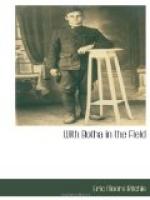I offer, with reserve, the following ingenious explanation of Kemp’s escape; it was told me later by several who saw the action. Near the end of his terrific trek through from the North-Western Transvaal to the German outpost for which he was making, Kemp was hotly pursued by the loyalist troops. His men were exhausted. Half of them were dismounted. All his horses were spent. In these conditions he was forced to the most trying form of fight—the rearguard and flank action. With his goal practically right ahead, he reached three of the parallel large sand dunes with which the veld around Upington is scattered. They were on his left flank. He swerved into them. Hotly pursued, he crossed two, and under the lee of the second left a party of good shots. Then, cantering away over the third, he doubled round on his tracks and with his exhausted followers made for the German outpost. When the Union troops came up they were ambushed at short range, and the check they got just served the fleeing rebel. In the pursuit afterwards our parties found traces of buried rations for horses and men. These had been provided with German thoroughness.
The second phase of the Free State Rebellion was a pantomime more than anything else; a week’s pantomime acted in the open veld in rain that never stopped. It was the most miserable week I have known. We left Upington on the 29th of November, reaching Kroonstad, Orange Free State, late next evening. Here the Commander-in-Chief was met by General Smuts, Minister for Defence; a consultation took place, and as a result we left by train for Bethlehem in the evening. Our arrival was timely, too. The place was in a perfect uproar. Nobody knew what was going to happen next. All the loyalistcivilians were under arms. The large mill of the Kaffrarian Steam Flour Company had been converted into a fort which was, in case of necessity, impregnable to rifle-fire. The rebels in the field had declared the New Republic practically established, with temporary capital at Reitz. Just before we saddled up to track them the news came of De Wet’s capture on the Malopi River, near Mafeking. The news put everyone in fresher spirits. The charm around the famous guerilla fighter had broken. That the Rebellion was doomed we all knew. But most of us were weary, nevertheless. It furnished a refresher.
We left a happier Bethlehem at a rainy dawn the next day. Half way to Reitz we outspanned in the rain. It rained all night. The following morning came back to mind a talk an old soldier and I had once while freezing one early morning awaiting the Channel boat at Greenock. Alluding to cold and misery, he said: “You don’t know what it is, my son, till you’ve been held up for three nights by rain in war-time in the South African veld, and spent the time standing in water. I did it outside Mafeking.” Well, I understand a little now.
The next day our scouts entered Reitz; the rebels had fled. For two days we operated against them. A day later General Botha returned to Reitz. Nothing was said at the time. The fact was that before we entrained at Reitz, on the 7th of December, Wessel Wessels and Serfontein were surrounded. A day later they surrendered: the Orange Free State Rebellion, in all its futility, was over.




